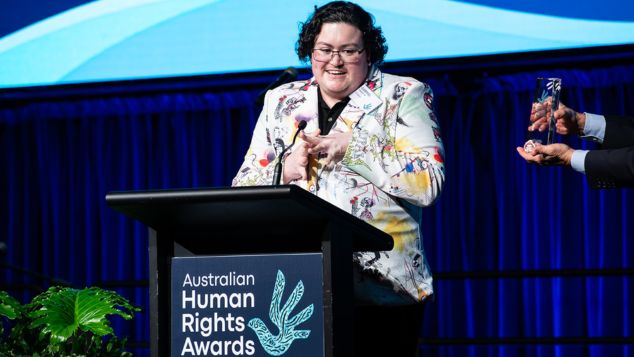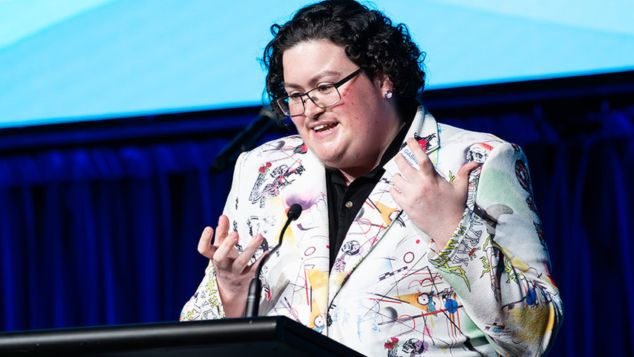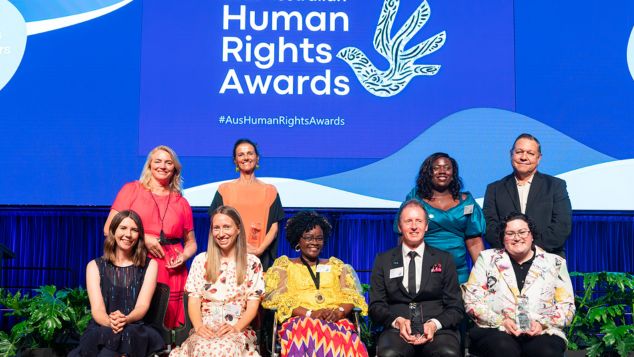
Western Australian mental health advocate Gabriel Osborne has been awarded the Australian Human Rights award for youth for their exceptional and courageous advocacy for LGBTIQA+ survivors of institutional abuse and conversion practices.
Warning: This story has details of suicide and mental health abuse which might be distressing to some readers. For 24-hour crisis support and suicide prevention call Lifeline on 13 11 14. For Australia-wide LGBTQI peer support call QLife on 1800 184 527 or webchat.
The annual awards that are given out ahead of International Human Rights Day draw attention to Australias leading practitioners in tackling injustice and disadvantage.
Osborne has used their lived experience to advocate for survivors of institutional abuse and LGBTQIA+ conversion practices. They recently set up Flying Free, a not-for-profit organisation working towards systemic reform nationally.
“I’ve only started my activism and advocacy journey over the last eighteen months to two years.” Osborne said in a video discussing their nomination.
Osborne shared their experience of abuse for over a year and a half of their life from when they were a patient in a treatment program that included the long-debunked practices that attempt to suppress a person’s sexuality or gender identity.
“I was subjected to really significant gay conversion therapy practices, and I was left suicidal and homeless.”
After setting up an online support group Osborne brought together many people who had been abused at Perth based Esther Foundation.
“I heard the stories of hundreds of other survivors and realised this wasn’t an isolated incident. This was happening all over the state and all over the country.”
Osborne’s work led to a law firm giving pro-bono representation to those who were abused, and lobbying led to a parliamentary inquiry into the facility. When the damning report was handed down it recommended the government push forward with legislation to ban conversion therapy practices.

Speaking to OUTinPerth Osborne said the accolade would make a big difference to their work.
“This award means we can increase public awareness of the important causes behind the award. We can build connections with people who can support us and make the changes we hope to see.
“We can also build trust as a truly peer-led organisation which is aware not just of the theoretical problems in the community but also how it impacts the individual people. I am excited that this award is bringing awareness to Flying Free, getting our name out there, showing our legitimacy and our ability to make change.” Osborne said.
Osborne is also looking forward to the state government introducing their legislation to ban suppression and change practices and tighten up the regulations around provision of mental health services.
“Myself and other activist-survivors have expressed that it is important that the ban is comprehensive and survivor-led.” Osborne said, suggesting that Victoria was the jurisdiction to look to for an example of getting the balance right.
“I would love to see a ban on LGBTQIA+ conversion and suppression practices, similar to the Victorian legislation through a comprehensive civil scheme with a criminal component.”
“Despite my lived experience of conversion practices being based on my sexuality, a conversion practices ban must also protect the trans community, especially trans kids and youth.” Osborne said.
When it comes to ensuring that dubious providers are not delivering mental health services, Osborne is calling on the government to commit to making a real connection with consumers.
“I am concerned about the government making changes without enough consultation with current and former consumers. The parliamentary inquiry into the Esther Foundation was great however it was very limited and didn’t hear from enough consumers, including men and those in regional areas.
“Legislation is being created when we don’t even know how many services are in operation, who is mostly being impacted and the types and frequency of non-evidence-based treatments being provided.” Osborne said.
Ensuring there is greater consultation and reaching out to a diverse range of community members is on the top of the list for Flying Free.
Alongside funding, resources and volunteers the new group is also looking out for people with professional skills who can help manage the organisation.
“Right now we’re being run by a team of people who have just have a lived experience, and who are passionate, but we don’t necessarily have the skills in finance, the skills in business management. We really are learning as we go, and we’re trying our best because this means so much to us. “ Osborne said.
For donations and funding, alongside government grants Flying Free is also looking towards philanthropic organisations and individuals who previously donated large amounts to the Esther Foundation.
While the foundation received funds from a wide range of businesses and individuals who would have the best of intentions when committing their funds, Osborne says it shows how important research and due diligence is when making a donation.
“Organisations or businesses should really be careful when they are donating to mental health, and specifically alcohol or drug services in WA, because currently there is actually no regulation for alcohol and other drug services.
“You can just open a rehabilitation provider and treat some of the most vulnerable people, which are those with addiction and serious mental health problems.
“You can just treat them however you like. There is no set standard that you have to abide by that you will be regulated to.
Osborne suggests that before making a donation people should do thorough research, including talking to other providers in the sector and consumers in the wider community area.

Women’s equity and racial equality advocate Juliana Nkrumah AM was awarded the prestigious Human Rights Medal at the awards.
Other awards went to Northern Pictures (Media and Creative Industries Award), Advocacy Tasmania (Community Award) and the Aboriginal Legal Service of Western Australia (Law Award).
Rosalind Croucher, Australia’s Human Rights Commissioner said those being recognised were inspiring individuals.
“Every year I’m inspired and deeply moved by the bravery, compassion and dedication of the people and organisations we honour through this event. I also pay tribute to all our finalists and the everyday human rights heroes who are quietly making their own unique contributions to making our community more equitable, inclusive and respectful.” Emeritus Professor Rosalind Croucher said.
The Commonwealth Attorney-General Mark Dreyfus delivered this year’s Human Rights Day Oration to mark the 75th anniversary of the Universal Declaration of Human Rights.
Reflecting on her award, Juliana Nkrumah said the declaration had been central to her life’s work.
“My life’s work has been shaped by the UDHR’s promise of freedom, justice and equality for all.” she said.
For 30 years, Nkrumah has worked to empower women, migrants and refugees, and advance their human rights. She also works with decision makers to increase their ability to fulfil and respect human rights.
“My desire is for government policies and services to recognise that human rights are non-negotiable and a foundation on which we can find solutions,” she said.
The Aboriginal Legal Service of Western Australia (ALSWA) received the Law Award for providing legal expertise, advocating for systemic change and empowering community.
ALSWA has been successful in litigation on the conditions of young people in the notorious Banksia Hill Detention Centre and Unit 18 at Casuarina Prison.
Advocacy Tasmania (Community Award) was recognised for its work through advocacy and representation to restore human rights for individuals such as older people, people living with disability or mental health issues, and people who use alcohol and drugs. The organisation draws on personal stories to advocate for systemic change.
Northern Pictures (Media and Creative Industries Award), creator of TV shows and documentaries such as Love on the Spectrum and See What You Made Me Do, was recognised for its powerful and inclusive storytelling. The production company provides a platform for voices that are rarely heard in mainstream media.
The 2023 Awards received 265 nominations, and 21 finalists were chosen across five award categories.
To get in touch with Flying Free head to their website.
Graeme Watson
Do you need some support?
If you are struggling with anxiety or depression, support and counselling are available from:
QLife: 1800 184 527 / qlife.org.au (Webchat 3pm – midnight)
QLife are a counselling and referral service for LGBTQIA+ people.
DISCHARGED: info@discharged.asn.au / discharged.asn.au
Discharged is a trans-led support service with peer support groups for trans and gender diverse folks.
Lifeline: 13 11 14 / lifeline.org.au
Beyondblue: 1300 22 4636 / www.beyondblue.org.au
You can support our work by subscribing to our Patreon
or contributing to our GoFundMe campaign.





